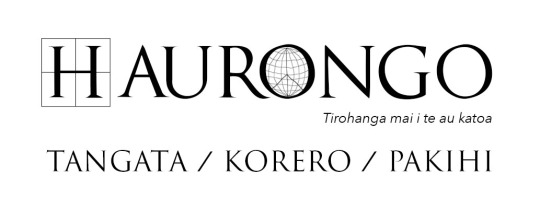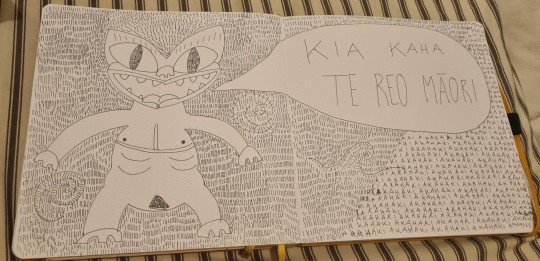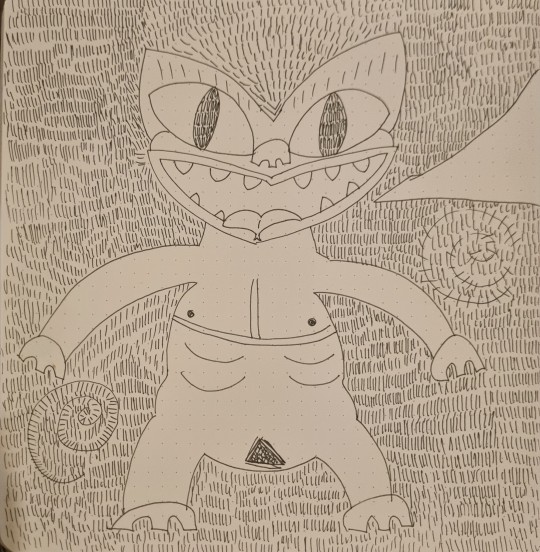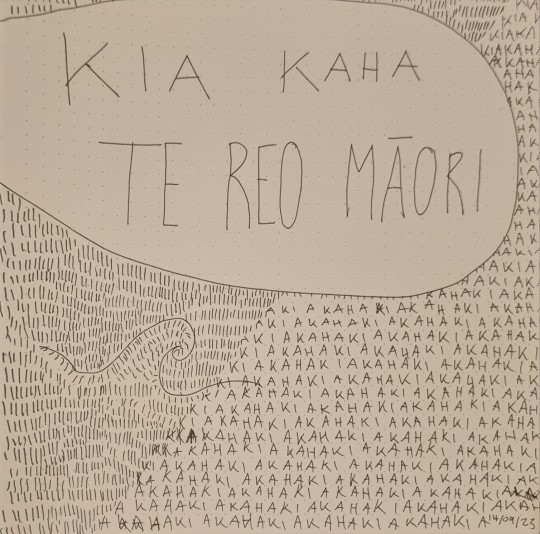#kōrero
Text
Te wiki o te reo Māori

View On WordPress
#Bernie Edwards#biography#compromise#harmony#I am Hana project#indigenous#kōrero#language#macrons#Māori language#Māori language week#New Zealand#Oriini Kaipara#peace#reconnection#reomāori#social media#spelling#Taranaki Chamber of Commerce#te reo#Te Reo Maori#te wiki o te reo Māori#translation#TSB Showplace#tāngata#viewpoint#WITT
0 notes
Note
Is it alright for people to learn te reo Māori if we aren’t Māori? Like is it an open language to learn, or is it more of a closed culture type thing? Just wanted to ask to be sure bc I know all the bs about cultural appropriation being framed as representation (like the bg3 shit just as an example). I hope I’m making sense aaaaaaa
dw you're making sense. but yeah, i've gotten this question a few times and the general consensus i've gotten from asking my māori followers for their opinions/knowledge is that it's definitely alright to learn te reo as long as you're respectful about the fact that it's an endangered + indigenous language. there's currently a heavy emphasis on teaching māori te reo for many important reasons but as long as you aren't taking up any of those specific resources or otherwise stepping on toes (and you need to actually listen if people say you're crossing a line; there are many aspects of te reo māori that require a basic understanding of māori cosmology, beliefs, and culture), you're fine and in fact generally encouraged to learn te reo māori since it's helping keep an endangered language alive :)
#as per usual if any māori disagree i would love to kōrero to hear your opinions and their reasons#i'm not a monolith and as diaspora māori i'm inevitably going to feel differently about certain topics. i'm just a guy on the internet etc#regardless this is both more or less my own opinion and the general consensus after speaking to other māori#do the bare minimum to not step on toes or be weird about it and you're actively encouraged to learn te reo māori
8 notes
·
View notes
Text
pay heed
to the strength
that is women.
Jacq Carter, Me aro koe ki te hā o Hineahuone!
#Jacq Carter#Jacqueline Carter#Puna Wai Kōrero#strong women#Women's Day#International Women's Day#Indigenous women#women#quotes for women#Maori literature#Maori poetry#New Zealand literature#poetry#poetry quotes#quotes#quotes blog#literary quotes#literature quotes#literature#book quotes
9 notes
·
View notes
Text
for this year's te wiki o te reo māori i will uh. get mihi mai rā stuck in my head again
#also help i realised a few days ago that the guy who sings that is also the#guy that hosts kōrero mai 💀 te reos georg etc#te reo māori#aotearoa#barking#no like jokes aside it's been stuck in my head for like literally 2 weeks at this point. help me#n also i feel bad/torn coz i wanna record smtg but I'll die before putting my face online. weh
13 notes
·
View notes
Text
kia ora, tonight i am feeling almost the full force of my disconnection with my culture and i am being so brave about it
#my brother is getting married tomorrow and im not even in the same country as him#which honestly hadnt bothered me until right now - i was genuinely okay because i still got to see him in july#and our sister and mum get to be there for him#but now that im feeling particularly fragile about knowing so little about being māori#and not being able to kōrero māori very well#its making me crave my whānau more yknow? like maybe thered be less of me missing if i had them with me#māori#captain speaks
15 notes
·
View notes
Text
happy matariki 🥰
#if u celebrate it!!#i think its really symbolic that it comes just after our winter solstice this year#anyway i hope yall have some good kai and kōrero with your family and friends today
1 note
·
View note
Text


Going for vibe and rhyme rather than literal meaning here.
"Ka kōrero mātou katoa" means "we all talk"*. "He waka eke noa" is a whakataukī (proverb) which is usually translated as "we're all in this together", in the sense of everyone coming together for the good of all. It uses the metaphor of a waka or traditional canoe, but "waka" can mean any form of transport including a ship.
I headcanon He Waka Eke Noa as the official whakataukī of the Revenge, partly because it fits the crew and the show really well, but also because it keeps getting used disingenuously in government and corporate settings, in that "we care about you but we're not going to fix the problems you're raising" kind of way. So it fits the worst parts of Stede's management style as well as the best parts.
*Normally Stede would say "Ka kōrero tātou katoa" because he'd be talking to the crew and so would use the "we" that means "me and all of you". But in this scene he's explaining it to the British so he uses "mātou" - me and them but not you.
219 notes
·
View notes
Text



Ko tāku toi tēnei mō te wiki o te reo
Māori.
Ko uaua tāku reo. He taonga reo. E rua, e rua. Ki ōku tūpuna, kia whakarongo
au ki a koutou. Ka tarai au.
Kia kaha Te Reo Māori ❤️🖤
---
Tāku kōrero i te reo Pākehā:
This is my art for Māori Language week.
My language is hard. It is a treasure. These both are true.
To my ancestors, I will/am listening to you. I will try.
Be strong, Māori language.
#te reo Māori#Māori#te wiki o te reo māori#new zealand#taniwha#aotearoa#mahuru māori#māori tag#my art
54 notes
·
View notes
Text
The island of Rarotonga in the Cook Islands is experiencing an outbreak of crown-of-thorns-starfish (taramea, Acanthaster planci), which could jeopardize the survival of its surrounding coral reef.
Local environmental organization Kōrero O Te `Ōrau has been tackling the outbreak since 2020 by training young Māori people in scuba diving and running regular expeditions to remove taramea from the reef and bury them inland.
The work has contained the outbreak on two sides of the island by collecting over 3,700 crown-of-thorns starfish, ultimately mitigating its impact on reef health. However, ongoing efforts are required. The project is also upskilling young Cook Islanders in marine management theory and practice.
266 notes
·
View notes
Text
btw once again i just wanna make it 100% clear that i am just one person on the internet. like i make sure to either openly ask other māori for their opinions on things and/or privately dm multiple māori i know to kōrero about our opinions, both ngāti kangaru and aotearoa māori since we occasionally have pretty huge differences in opinions based on our life experience, but please remember i'm just some guy online and i'm really not the end all be all for definitive answers on the general consensus of an entire race.
not having a go at anyone here at all and least of all the ask i just answered (would not have answered it if i was uncomfortable with it), i'm just very aware that i have a reasonable reach in a few specific political spheres and more specifically that i've become known for speaking on māori politics and issues so i make sure to repeat this occasionally. please make sure to source your answers from multiple people, follow other māori, and do your own research outside of asking one or two māori about things since one day i'm inevitably gonna be dead fucking wrong at some point or idk, voice an extremely controversial opinion in māori circles or something lol
#obligatory 'i've gained an absolute fucktonne of followers in the past two weeks for political māori posts' semi regular message#i've had multiple govt adjacent aotearoa pākehā try and work with me on certain things which is terrifying LOL
8 notes
·
View notes
Text
Full episode of Pio Terei Tonight from 2021 featuring Rhys
#rhys darby#interview#2020s#2021#link to full ep#nz#sorry for not including time stamps i both have a migraine and was just excited to find this lol
57 notes
·
View notes
Text
i think i speak more te reo māori than i give myself credit for to be fair i just... struggle with the confidence to engage with others? if someone has a kōrero with me in māori i will just respond in english even though i fully understand everything they're saying. super embarrassing. something i would love to Not Do in fact!
some of my pākehā friends are waaaaaay more confident speaking the language than i am and i think it's just cause there's no baggage for pākehā and tangata tiriti like there is for tangata whenua. which feels unfair. but the only real way to get past it is to just keep pushing myself i guess and uni WILL push me esp. in the reo classes lol
#cat meows#i love when i go to my group and i'm surrounded by conversation in reo māori#but also with the gaps in my level of fluency + being deaf it's like. dinner table syndrome LOL#like. with english i'm so used to it that i can fill in the gaps easier#but māori words... i'm so surrounded by reo pākehā that my brain can't fill it in#unless i have full context and. dinner table syndrome. i never do!#it's so complicated :(
4 notes
·
View notes
Text

E ai ki tētahi matakite tuauri ka puta mai ‘ngā manu mātauranga e rua’ ki runga ake i te tihi o Taranaki. Ko aua ‘manu e rua’ ko Te Whiti-o-Rongomai rāua ko Tohu Kākahi – nā rāua te hapori whakamārie o Parihaka i whakatū i te pūtake o te Maunga o Taranaki, he punanga i whakaruruhau i ngā Māori i haukerekerehia ai i ngā raupatu whenua o ngā tekautau o 1860. Ko rāua ngā kaihautū o te ātetenga whakamārie ki te whakahēnga o te Karauna i te tino rangatiratanga Māori, ki te horomi haere a tauiwi i te whenua Māori.
Kei te heke te pō i te Resurrection of Te Whiti Over Taranaki, 1975–77. Kei te ū tonu te Maunga o Taranaki hei tohu o te mana o te iwi o Taranaki. Kei te pupuri te manu kōrero, a Te Whiti, i te raukura, he awe toroa e tohu ana i tōna kaupapa, arā, te maungārongo me te ngākau aroha.
He kaikawerongo, he ringa toi hoki, a Selwyn Muru, ā, kua arotahi ia ki te whakapāho i te tirohanga Māori e pā ana ki te hītori, ki ngā āhuatanga o te wā, ki ngā takakinotanga e haere ake nei, e haere ake nei. Ko ēnei toi peita e rua, he wāhanga nō tētahi huinga toi peita e 37 i oti ai i a Selwyn whai muri atu i tōna haerenga ki Parihaka i te wā o te hui nui mā ngā ringa toi me ngā ringa tuhi i Waitara, i te tau 1975. I te wā o te whakaaturanga i te tau 1979 ka puta te wawata o Muru kia tū āna toi hei pou whakamauru i ngā raruraru kei waenga i te Māori me te Pākehā mā te wānanga: ‘Ko tā te marae he whakaōrite i te tangata. Ko te tūmanako ia, ka pērātia tā te whare whakairi toi.’
An ancient prophecy foretold the appearance of ‘two birds of knowledge’ over the peak of Taranaki. These ‘two birds’, Te Whiti-o-Rongomai and Tohu Kākahi established the pacifist community of Parihaka, on the foothills of Mount Taranaki, which offered hope and refugee for Māori who suffered land confiscations in the 1860s. They led their people in a peaceful resistance against the Crown’s denial of Māori sovereign rights and settler immigrants’ encroachment on Māori land.
Night is falling in Resurrection of Te Whiti Over Taranaki, 1975–77. Mount Taranaki, the symbol of the Taranaki people’s mana (power) remains steadfast. Master orator Te Whiti, holds the raukura, three albatross feathers, symbolic of peace and goodwill that he preaches.
As both a journalist and artist, Selwyn Muru has focused on communicating Māori perspectives of history, contemporary life and ongoing injustices. These two paintings are part of a suite of 37 paintings that Selwyn produced after visiting Parihaka during the 1975 Māori artists and writers hui in Waitara. At the time of their exhibition in 1979, Muru expressed his hope that his work could assist in reconciling conflicts between Māori and Pākehā through the promotion of dialogue: ‘The marae is a great leveller. Hopefully the gallery will be one too.'
Title:
Resurrection of Te Whiti over Taranaki
Selwyn Muru
Production date
1975-1977
Medium
oil on board
Dimensions
1220 x 1357 mm
Credit line
Courtesy of Muru Whānau
12 notes
·
View notes
Text
Ko wai au?
Nō Tahiti, nō Pitcairn Island, nō Ingarani ōku tūpuna. Kei Tāmakai Makaurau e noho nei au. Ko strandedio taku Twitter. Ko stranded.io taku blog. Kōrero Māori mai.
6 notes
·
View notes
Text

Decided to go with the transliteration of June rather than Pipiri. Pipiri relates to huddling together because of the cold, and that makes no sense for June in the Caribbean.
There's a whole wider debate about whether we should use transliterations for calendar months or the traditional Māori names which don't quite match up to the same time period. There's a good kōrero here if you're interested: https://tuhi.co.nz/blogs/news/why-we-use-the-kupu-maori-loan-words-in-our-planners
64 notes
·
View notes
Text
A poem about how time is a circle, echoing down through the generations. And also colonisation and psychosis, I suppose.
You, my tūpuna
A hundred years after
the empire came.
Forced into a school,
Forced to speak the
Queen's English.
You didn't know how
you didn't kōrero their reo
so you stayed quiet
to avoid punishment.
Yet punish you they did
for disobedience
for not listening
for silence.
Me, your moko,
Two hundred fifty years
After the empire came.
Forced into a school,
Forced to be a good student.
I had a split
from reality.
Stayed quiet to avoid
killing everyone
as the delusion said speaking would do
Yet they still punished me
for disobedience
for not listening
for silence.
A hundred fifty years between us
Yet I feel the echo of you in me
A hundred fifty years between us
Yet the colonisation lives on
A hundred fifty years between us
Yet we are a pool of water reflecting each other
They see our silence as breaking their rules,
I see it as survival.
24 notes
·
View notes